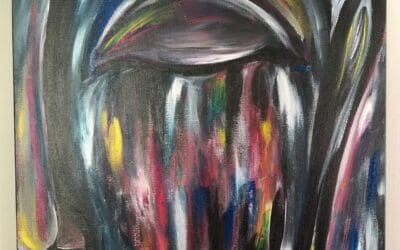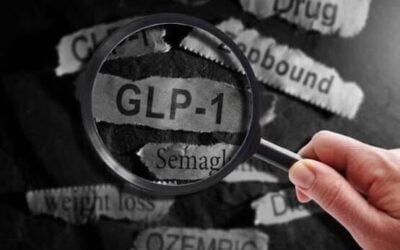Daniel Heller, ND
Little could be further from the truth. The neurotransmitter/monoamine/brain chemistry imbalance theory of depression and mental illness is a pseudoscientific myth2 and a marketing miracle.3 At the cutting edge of neuroscience and neuropharmacology, the whole project of finding brain chemistry flaws or imbalances that give rise to depression, and for finding molecules that will “balance” brain chemistry, has been abandoned.For decades, we’ve been told by all manner of experts that mental illness and depression are the results of brain chemical imbalances—diseases of disordered neurotransmitters, specifically the monoamines serotonin, norepinephrine, and dopamine. This began with the introduction of chlorpromazine in the 1950s, and continued apace as more and more drugs were introduced, with the 1988 marketing approval for fluoxetine launching the whole enterprise onto a new, supercharged level.1 Since then, selective serotonin reuptake inhibitors (SSRIs) and SNRIs (that target norepinephrine), as well as antipsychotics, mood stabilizers and other psychoactive compounds, have become a multi-billion dollar per year enterprise. Psychopharmacology and the brain chemistry theory of depression and mental illness have become cultural touchstones and occupy a place of privilege in the media and in medicine, such that questioning them is seen as heretical. We’ve been told, and believe, that the evidence for this approach is unassailable.
Scientists on the front line of this issue have realized over the last decade that…
The apparent mountain of scientific evidence and controlled trials that support the theory and the practice has crumbled under rigorous scrutiny.4 Even the original trials submitted to the FDA to approve the marketing of SSRIs and SNRIs failed to prove their efficacy or superiority.5
Despite decades of research, there is no clear proof to support a relationship between brain chemistry, neurotransmitters, and depression, or other mental and psychiatric disorders; there is also plenty of research that successfully disproves it.6
Historians of science and medicine who have retraced the steps of this theory have found a trail of small, uncontrolled trials from which faulty conclusions were drawn, as well as a breathtakingly successful marketing narrative engineered by “Big Pharma” that ran way ahead of the science.7
Unfortunately, the news that the “brain chemistry imbalance” theory has never been proven, or has been disproven, hasn’t yet reached – or has been kept from – the public and clinicians, including holistic practitioners and naturopathic doctors. Conventional clinicians of all stripes believe their own eyes, which tell them (anecdotally, of course) that the patients to whom they’ve given antidepressant medications (ADMs) have gotten better. And rare is the person who doesn’t know someone who thanks her lucky stars for the advent of SSRIs that “saved my life.” Naturopathic doctors and holistic practitioners hear from lab companies about the value of measuring neurotransmitter imbalances, as well as the value of “neurotransmitter-balancing” supplements like 5-HTP, tryptophan, tyrosine, and the like, which gives the pseudoscience a scientific veneer.
Like the emperor who had no clothes, it is difficult to see beyond the myth.8 Prestigious major media sources have actually referred to the effectiveness of ADMs in the very same articles that point out that there is no evidence for their effectiveness.9 (In a small percentage of the most severe cases, where placebo is ineffective, SSRI is superior to placebo.) Medical journals have published important research exposing the brain chemistry theory as unproven, while explaining in accompanying editorials that “depression is a brain disease caused by chemical imbalances.”2 (!)
How Did We Get Here?
The biochemical theory of depression arose originally when a tuberculosis drug, iproniazid, was found to have a side effect of elation in some patients. When the drug was later given to psychiatric patients in an uncontrolled trial, the investigators claimed that it had a measurable effect. Further uncontrolled trials on tricyclic compounds, performed without any reproducible quantification, found them effective for depression. A decade later, after these drugs had come to be used as ADMs, an attempt was made to explain their apparent effectiveness, and the monoamine neurotransmitter theory was born.10 One source of confirmation for this theory came from a source familiar to naturopathic physicians: the apparent tendency of reserpine, a Rauwolfia serpentina extract, to cause depression. Reserpine was thought to decrease brain levels of monoamine neurotransmitters. The theory seemed to fit the evidence.
It wasn’t until the 1970s that researchers found that the puzzle pieces didn’t fit together so neatly after all. It turns out that only 6% of people taking reserpine, even for prolonged periods, develop depression (contradicting what I was taught about Rauwolfia in naturopathic medical school
2 decades later!) And of these 6%, many had suffered from depression before.11
One of the most potent nails in the coffin of the neurotransmitter theory comes again from reserpine, from an overlooked study published in The Lancet in the mid-1950s. In this placebo-controlled, blinded study that used a standardized rating scale, patients with anxiety and depression were given reserpine and improved. That’s right—a substance that lowers brain serotonin effectively treated depression and anxiety.12 Ironically, the authors of the papers originally proposing the monoamine theory of depression had cited evidence that reserpine acted as a monoamine oxidase inhibitor (MAOI).
The scientific history of the brain chemistry theory is peppered with similar instances. The whole evidence base for it is constructed of little else: bad science, misreading of evidence, researchers and clinicians unaware of their own bias or agenda, and so on.
In the modern era, numerous rigorous studies and meta-analyses have attempted to confirm the effects of neurotransmitter depletion and of ADMs. These experiments have yielded straightforward results: reducing brain levels of monamines in healthy volunteers who’ve never been depressed has no effect on the subject’s mood, and ADMs are not clinically more effective than placebo.13 Interestingly, trials on ADMs have found statistically significant, but not clinically meaningful, results: the reduction in symptoms fails to reach clinical effectiveness.
If That’s The Case, Then How Do SSRIs Work?
If it occurred to you that this is a trick question, you’re on the right track. SSRIs and SNRIs don’t appear to work at all. At this point, though, anyone can be forgiven for thinking that they do, and are scientifically proven, and that depression is a brain chemistry imbalance.
In the interest of fairness, and to look at the issue from another angle, ADMs of all types work marvelously. In fact, they work just as well as placebo. In the vast majority of cases – certainly the overwhelming majority of cases that a naturopathic doctor or a primary care doctor is likely to see – ADMs, placebo, and Hypericum perforatum (St John’s wort) extract all work equally well. Roughly 60-70% of your patients will improve in response to any one of them, with the important distinction that placebo and St John’s wort carry no risk of long-term side effects or increased risk of suicide, unlike SSRIs.14 In fact, based on the evidence, you could prescribe Rauwolfia to your depressed patients – at least to those who hadn’t recently been on an ADM – and expect a similar response rate.
There is one small subset of the population in which SSRIs are superior to placebo, and that is those with the worst cases of very severe depression. To put this in perspective, this means that SSRIs are as effective as (or no more effective than) placebo in patients with mild depression, moderate depression, or severe depression, or who are at the “mild” end of very severe depression. Using the Hamilton Rating Scale for Depression (HRSD),15 the inflection point where SSRIs seem to outperform placebo is a score of between 25 and 30. Although researchers differ on this question, it is possible that SSRIs do not become more effective in this population, but rather that placebo is less effective in the worst cases of very severe depression.
Didn’t the FDA Approve SSRIs for the Treatment of Depression?
The first paper to broach this whole issue was an article by Kirsch and Sapirstein from 1998 that was intended to investigate placebo activity, not depression.16 Published 10 years after the introduction of fluoxetine, and long after medicine and the media had embraced the SSRI “miracle,” their paper was so controversial that the American Psychological Association published it with a special editor’s note anticipating an onslaught of criticism – which is what they got.
The study analyzed 19 double-blind trials of ADMs involving 2318 patients. It found that 75% of the effect of ADMs could be accounted for by the placebo effect. It also found that medications not considered ADMs worked just as well as ADMs, as long as they had side effects. Because a placebo without side effects allows a subject to break blind, compared to a medication that causes side effects, they interpreted this to mean that the use of an active placebo – one that causes side effects – would be as effective as ADMs.
Kirsch’s response to the firestorm of criticism was to analyze, in a paper published 10 years later,5 the original data submitted to the FDA in the applications for marketing approval of fluoxetine, paroxetine, sertraline, venlaxafine, citalopram, and nefazodone. The results he found were consistent with the other research cited here, and with a wider audience, ignited an even greater controversy that revealed how unscientific attitudes in medicine often are.17 18 This study required a Freedom of Information Act request, since drug companies are required to submit all pre-approval trials of a medication to the FDA, but often do not publish any negative trials. (They also often publish data from successful trials multiple times, in different journals, disguising the fact that the results are from 1 trial, thus getting more bang, or bank, for their research buck.19)
What Happens To the Myth Now?
Nearly everyone has a story or anecdote that makes these revelations seem preposterous and incredible. Whether it’s a psychiatrist convinced that his or her patients have responded to ADMs, or the supposed evidence for natural assessment and treatment of “neurotransmitter imbalance” presented by lab or supplement companies and natural medicine experts, it can be hard to believe that it is all a myth. And yet, a nearly universal but seemingly silent chorus of scientists and, gradually, mainstream media, have begun to acknowledge overwhelming evidence: the “brain chemistry imbalance” theory of depression, and most other mental illness, was always and still is, a mirage.20
Implications for Practice
Depression is real. The fact that drugs don’t work any better than placebo, that we have only theories as to its cause, and that placebo is an effective treatment for most cases of depression doesn’t diminish or undermine people’s real and legitimate suffering. But as clinicians sworn to primum non nocere, we can best serve our patients by supporting them if they wish to get off SSRIs (the dangers of which would require several more literature reviews), and presenting them with treatment plans based on science and evidence rather than failed theories and marketing. This would mean abandoning the use of 5-HTP and other neurotransmitter precursors which have no verifiable connection to depression. It also means not subjecting patients to the hassle and expense of lab tests that measure analytes such as serotonin or 5-HIAA (a serotonin metabolite), which also have no detectable relation to depression.
Evidence-based approaches to depression that really work include, in order of importance, include the following:
- Exercise prescriptions
- Naturopathic diet prescriptions, including food allergy elimination
- Psychotherapy from a qualified professional
- Social / work stressors evaluation
- Mindfulness / Meditation / Prayer practice
- Daily “Attitude of Gratitude” practice
- “Happiness” education, eg, books such as Control Your Depression or Feeling Good
- St John’s wort
- Supplemental nutrition, including vitamins and minerals
The brain chemistry-depression myth is, at this point, thoroughly embedded in our culture. It requires a dogged dedication to science and truthfulness to swim against that tide, whether it is coming from mainstream medicine, companies that support naturopathic medicine, or patients. But in the interest of truly effective clinical practice, it is the right thing to do.
 Daniel Heller, ND is a 1995 graduate of the National College of Naturopathic Medicine. He has practiced in Santa Cruz County, CA; Southern Fairfield County, CT; and currently practices in Marin County, CA. Dr Heller was a research fellow with Optimal Health Prevention and Research Foundation of San Diego, CA, from 2009-2012. He is the founder and clinical director of www.pmscomfort.com, a business and web resource dedicated to educating, empowering, and providing natural relief for women with PMS and PMDD.
Daniel Heller, ND is a 1995 graduate of the National College of Naturopathic Medicine. He has practiced in Santa Cruz County, CA; Southern Fairfield County, CT; and currently practices in Marin County, CA. Dr Heller was a research fellow with Optimal Health Prevention and Research Foundation of San Diego, CA, from 2009-2012. He is the founder and clinical director of www.pmscomfort.com, a business and web resource dedicated to educating, empowering, and providing natural relief for women with PMS and PMDD.
References
- Angell M. The Epidemic of Mental Illness: Why? June 23, 2011. The New York Review of Books Web site. http://www.nybooks.com/articles/archives/2011/jun/23/epidemic-mental-illness-why/. Accessed November 15, 2013.
- Ioannidis JP. Effectiveness of antidepressants: an evidence myth constructed from a thousand randomized trials? Philos Ethics Humanit Med. 2008;3:14.
- Angell M. The Illusions of Psychiatry. The New York Review of Books Web site. July 14, 2011. http://www.nybooks.com/articles/archives/2011/jul/14/illusions-of-psychiatry/. Accessed November 15, 2013.
- Trivedi MH, Rush AJ, Wisniewski SR, et al. Evaluation of outcomes with citalopram for depression using measurement-based care in STAR* D: implications for clinical practice. Am J Psychiatry. 2006;163(1):28-40.
- Kirsch I, Deacon BJ, Huedo-Medina TB, et al. Initial severity and antidepressant benefits: a meta-analysis of data submitted to the Food and Drug Administration. PLoS Med. 2008;5(2):e45.
- Whitaker R. Anatomy of an Epidemic: Magic Bullets, Psychiatric Drugs, and the Astonishing Rise of Mental Illness in America. New York, NY: Broadway Books; 2011.
- Lacasse JR, Leo J. Serotonin and depression: A disconnect between the advertisements and the scientific literature. PLoS Med. 2005;2(12):e392.
- Kirsch I. The Emperor’s New Drugs: Exploding the Antidepressant Myth. New York, NY: Basic Books; 2010.
- Mukherjee S. Post-Prozac Nation: The Science and History of Treating Depression. April 19, 2012. The New York Times Web site. http://www.nytimes.com/2012/04/22/magazine/the-science-and-history-of-treating-depression.html. Accessed November 15, 2013.
- Schildkraut JJ. The catecholamine hypothesis of affective disorders: a review of supporting evidence. Am J Psychiatry. 1965;122(5):509-522.
- Mendels J, Frazer A. Brain biogenic amine depletion and mood. Arch Gen Psychiatry. 1974;30(4):447-451.
- Baumeister AA, Hawkins MF, Uzelac SM. The myth of reserpine-induced depression: role in the historical development of the monoamine hypothesis. J Hist Neurosci. 2003;12(2):207-220.
- Fournier JC, DeRubeis RJ, Hollon SD, et al. Antidepressant drug effects and depression severity: a patient-level meta-analysis. JAMA. 2010;303(1):47-53.
- Moncrieff J, Cohen D. Do antidepressants cure or create abnormal brain states? PLoS Med. 2006;3(7):e240.
- Zimmerman M, Martinez JH, Young D, et al. Severity classification on the Hamilton Depression Rating Scale. J Affect Disord. 2013;150(2):384-388.
- Kirsch I, Sapirstein G. Listening to Prozac but hearing placebo: A meta-analysis of antidepressant medication. Prevention & Treatment. 1998;1:2a. http://psychrights.org/Research/Digest/CriticalThinkRxCites/KirschandSapirstein1998.pdf. Accessed November 15, 2013.
- Kirsch I. Challenging received wisdom: Antidepressants and the placebo effect. McGill J Med. 2008;11(2):219-222.
- Huedo-Medina TB, Johnson BT, Kirsch I. Kirsch et al.’s (2008) calculations are correct: reconsidering Fountoulakis & Möller’s re-analysis of the Kirsch data. Int J Neuropsychopharmacol. 2012;15(8):1193-1198.
- Turner EH, Matthews AM, Linardatos E, et al. Selective publication of antidepressant trials and its influence on apparent efficacy. N Engl J Med. 2008;358(3):252-260.
- Valenstein E. Blaming the Brain: The Truth About Drugs and Mental Health. New York, NY: The Free Press; 1998.





















